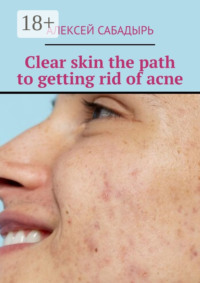Kitabı oku: «Clear skin the path to getting rid of acne»
© Алексей Сабадырь, 2025
ISBN 978-5-0062-5442-8
Created with Ridero smart publishing system
Chapter 1: Why acne appears and how to deal with it
Acne is the result of various factors affecting the skin. To understand why they occur, it is necessary to understand the main causes and ways to prevent them.
One of the main causes of acne is excess sebum production. This can happen due to hormonal imbalance, stress, poor diet or poor skin care. Sebum secreted by the sebaceous glands can clog pores and lead to inflamed acne.
Another cause of acne may be hyperkeratosis – a violation of the process of exfoliation of skin cells. If skin cells are not exfoliated properly, they can clog pores and cause acne.
To combat acne, you need to take a holistic approach. It is important to maintain skin hygiene, choose the right cosmetics, lead a healthy lifestyle, eat right and pay attention to skin care. In some cases, a consultation with a dermatologist may be required to prescribe individual treatment.
Chapter 2: Main Causes of Acne
Acne is a problem that can occur in every person, regardless of age and gender. They can be caused by a variety of factors, and it is important to understand the underlying causes.
Hormonal imbalance
One of the most common factors that cause acne is changes in hormone levels in the body. Teenagers and women often experience acne during menstruation due to increased levels of hormones such as testosterone.
Unbalanced diet
Nutrition plays an important role in skin health. Overeating fatty and plain foods can contribute to acne by increasing the production of sebum, the skin’s natural oil.
Improper skin care.
Incorrect use of cosmetics, insufficient cleansing of the skin and lack of daily care can lead to clogged pores and the formation of acne.
Stress
Your psycho-emotional state can also affect the appearance of acne. Stress causes changes in the body that can lead to deterioration of the skin.
Genetic predisposition
In some people, acne may occur due to hereditary factors. If your parents or relatives had skin problems, you may be more likely to develop acne.
The main causes of acne may vary, but the main thing to remember is that a healthy lifestyle, proper nutrition and skin care will help prevent its occurrence.
Chapter 3: Eating Well for Healthy Skin
Proper nutrition plays a huge role in the condition of our skin. It is our largest organ and reflects all changes in the body, including our nutrition. Therefore, it is important to watch what we eat to keep our skin healthy and glowing.
Get enough vitamins and minerals. Vitamins A, C and E are especially important for skin health, as they help hydrate, strengthen and protect against external aggressors. Make sure your diet includes foods rich in these vitamins, such as fruits, vegetables, nuts and seeds.
Drink enough water. Hydration plays a key role in improving skin health. Drink at least 8 glasses of water a day to keep your skin firm and hydrated.
Avoid foods that can cause inflammation. Beware of foods rich in sugar, fatty foods and fried foods, as these can cause inflammation in the body and affect your skin.
Pay attention to your fat intake. Healthy fats such as Omega-3 and Omega-6 play an important role in maintaining healthy skin. Make sure your diet contains fish, nuts, avocado and flaxseed oil.
Eat enough protein. Protein is essential for skin cell renewal and maintaining skin elasticity. Include meat, fish, eggs, dairy products and plant sources of protein in your diet.
Nutrition plays a huge role in the condition of our skin. By following a healthy diet and paying attention to your nutrition, you can improve the condition of your skin and keep it healthy and glowing for years to come.
Chapter 4 – How to Maintain Hormonal Balance to Prevent Acne
To maintain hormonal balance and prevent acne, there are a number of recommendations and steps you need to follow.
Proper nutrition
Proper nutrition is of great importance for hormonal balance. Eating healthy foods such as fruits, vegetables, nuts, fish, whole grains, and avoiding fatty and sugary foods helps improve overall health and balance hormones.
Regular physical activity.
Sports and exercise help improve blood circulation and stimulate the production of happy hormones, which has a positive effect on hormonal balance.
Sleep and rest.
Adequate sleep and regular breaks during the day not only help relieve stress, but also improve the overall health of the body, which is reflected in the functioning of hormones.
Ücretsiz ön izlemeyi tamamladınız.
